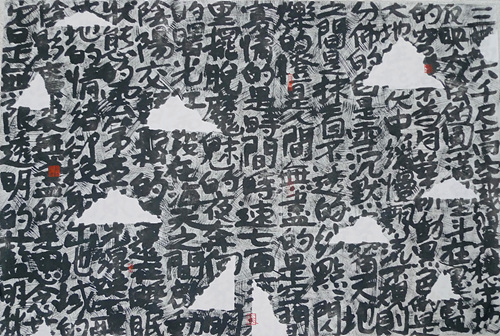
Departure
Fung Ming Chip
This space features Departure, Triptych, a seminal work by Hong Kong–born artist Fung Ming Chip.
A radical experimental calligrapher, Fung deconstructs and reimagines the tradition of East Asian calligraphy by interweaving Eastern and Western scripts, forms, and visual languages.
Since emigrating to the United States in 1977, he has developed over a hundred original calligraphic systems—such as “Time Script,” “Emotive Script,” and “Sand Script”—each investigating the temporal, material, and sensory dimensions of writing.
Departure consists of three large panels that visualize a gradual journey—from language to form, from form to sensation.
The first panel is densely filled with Chinese characters meticulously arranged within a grid. These characters are not meant to be read, but to be seen. Their repetition, rhythm, and pattern emphasize the visual nature of writing—calligraphy as image.
In the second panel, the characters begin to dissolve. Strokes float like fragments of stone in an abstract landscape. Here, the materiality of the ink and the gesture of the brush become more pronounced, revealing the physical presence of the artist.
By the third panel, the characters have vanished entirely. All that remains are scattered dots—the traces of where the brush once lingered. These marks register time not as narrative, but as presence, as resonance. Calligraphy becomes a record of lived time, of gesture slowed into memory.
The title Departure signifies a departure from legibility, from tradition, from the fixed structures of language. It reflects the artist’s own aesthetic migration in search of new ways of seeing, sensing, and inscribing identity.
Through this work, Fung Ming Chip expands the sensibility of classical calligraphy into a contemporary visual language—exploring language and identity, migration and boundary, and ultimately, the untranslatable language of sensation.
Here, the “unreadable” becomes the most eloquent.
What cannot be deciphered may be most deeply felt.
A radical experimental calligrapher, Fung deconstructs and reimagines the tradition of East Asian calligraphy by interweaving Eastern and Western scripts, forms, and visual languages.
Since emigrating to the United States in 1977, he has developed over a hundred original calligraphic systems—such as “Time Script,” “Emotive Script,” and “Sand Script”—each investigating the temporal, material, and sensory dimensions of writing.
Departure consists of three large panels that visualize a gradual journey—from language to form, from form to sensation.
The first panel is densely filled with Chinese characters meticulously arranged within a grid. These characters are not meant to be read, but to be seen. Their repetition, rhythm, and pattern emphasize the visual nature of writing—calligraphy as image.
In the second panel, the characters begin to dissolve. Strokes float like fragments of stone in an abstract landscape. Here, the materiality of the ink and the gesture of the brush become more pronounced, revealing the physical presence of the artist.
By the third panel, the characters have vanished entirely. All that remains are scattered dots—the traces of where the brush once lingered. These marks register time not as narrative, but as presence, as resonance. Calligraphy becomes a record of lived time, of gesture slowed into memory.
The title Departure signifies a departure from legibility, from tradition, from the fixed structures of language. It reflects the artist’s own aesthetic migration in search of new ways of seeing, sensing, and inscribing identity.
Through this work, Fung Ming Chip expands the sensibility of classical calligraphy into a contemporary visual language—exploring language and identity, migration and boundary, and ultimately, the untranslatable language of sensation.
Here, the “unreadable” becomes the most eloquent.
What cannot be deciphered may be most deeply felt.
